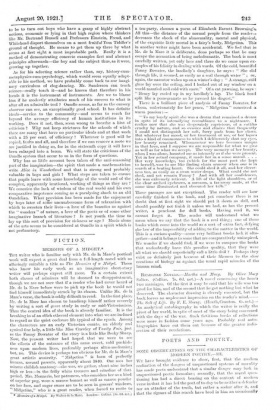FICTION.
MEMOIRS OF A MIDGET.*
Tim writer who is familiar only with Mr. de la 3fare's poetical work will expect a great deal from a full-length novel with so alluringly suitable a title as The Memoirs of a Midget. Those who know his early work as an imaginative short-story writer will perhaps expect still more. To a certain extent both classes of admirers will be doomed to disappointment, though we are not sure that if a reader who had never heard of Mr. de In Mare before were to pick up the book he would not find himself immediately struck by its charm. Unlike Mr. de la Mare's verse, the book is oddly difficult to read. In the first place, Mr. de la Mare has chosen to handicap himself rather severely by writing a sort of genre study in early or mid-Victorianism. Thus the central idea of the book is already familiar. It is the breaking in of an elfish ethereal element into what wo are inclined to regard as the quiet cocksure life typical of the epoch. Among the characters are an early Victorian curate, an elderly and cynical fine lady, a little like Miss Crawley of Vanity Fair, just as the Fanny Bowater of the story is a little like Becky Sharp. Now, the present writer had hoped that we were to see the effects of the entrance of this same sweet, cold puckish- ness upon modern lives, preferably perhaps ultra-modernist; but, no. This device is perhaps too obvious for Mr. de la Mare's great artistic austerity. " Midgetina " is born of perfectly human, normal parents, apparently about 1840. One sees her minute childish anatomy—she was, we gather, about nine inches high or less—in the frilly white trousers and crinoline of that period. Mrs. Monnerie, her patroness, who considers her as a kind of superior pug, wore a mauve bonnet as well as mauve powder on her face, and sugar canes are to be seen in grocers' windows. Midgetina," who is a great reader, when forced to recite to • memoirs of a Midget. By Walter do la ][are. London : Collins. [6s. 6d. net.] a tea-party, chooses a poem of Elizabeth Barrett Browning's. All this—the distance of the normal people from the reader—
decreases the shock of the abnormality, mental and physical, of the exquisite little mortal in a fairy's body, Midgetina. This in another writer might have been accidental. We feel that in Mr. de la Mare it is deliberate, done perhaps so that ho may escape the accusation of being melodramatic. The book is most carefully written, yet only here and there do we come upon ex- amples of his fclioity in dealing with words. Of the cold, beautiful
Fanny Bowater, the landlady's daughter, ho says " She slid through life, it seemed, as easily as a seal through water " ; or, again, the narrator wakes up on a winter's day : " A strange, still glare lay over the ceiling„and I looked out of my window on a
world mantled and cold with snow." Of a eat yawning, he says : " Henry lay curled up in my landlady's lap. The black head split like a pomegranate as he yawned his disgust."
There is a brilliant piece of analysis of Fanny Bowater, for whom, unfortunately for her peace, " Midgetina " conceived a warm passion " To my lonely spirit she was a dream that remained a dream in spite of its intensifying resemblance to a nightmare. I realize now that she was desperately capricious, of a catlike cruelty by nature, and so evasive and elusive that frequently I could not distinguish her soft, furry pads from her claws. But whatever her mood, or her treatment of me, or her lapses into a kind of commonness to which I deliberately shut my eyes, her beauty remained. Whomsoever wo love becomes unique in that love, and I suppose we aro responsible for what wo give as well as for what we accept. The very memory of her beauty, when I was alone, haunted me as intensely as if she were present. Yet in her actual company, it made her in a sense unreal. . Her very knowledge, too (which for the most part she kept to herself), was to me like finding chain armour when ono is an search of a beating heart. She could shed it all, and her clever- ness too, as easily as a swan water-drops. What could she not shod, and yet remain Fanny And with all her confidences, she was extremely reticent. A lift of the light shoulders, or of the clear arched eyebrows, a sarcasm, a far-away smile, at the same time illuminated and obscured her talk."
These passages are not exceptional. The reader will see how carefully finished is the book, and yet somehow there is no doubt that at first sight we should put it down as dull, and
should possibly not finish it unless we had, as has the present writer, a penchant for dull books. Having read it, wo cannot forget it. The reader will understand what wo mean when we say that the book is a real thing ; one of those books which come into the world as a sort of extra fact, defying the law of the impossibility of adding to the matter in the world. This is a curious quality—some very brilliant books lack it alto- gether—and it belongs to some that arc comparatively uninspired.
We wonder if we should find, if we were to compare the books that undoubtedly have this peculiar quality, that they were all what we should superficially call a little dull ? Perhaps they exist so definitely just because of their likeness to the slow creations of biology as against the usual rapid miracles of the human mind.


































 Previous page
Previous page